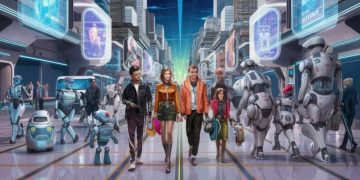Gen Z’s Impact: Shaping the Future of Work in the US

The Impact of Gen Z on the Future of Work in the US: Expectations and Challenges reveals how this generation’s unique values, tech-savviness, and desire for purpose-driven careers are reshaping workplace dynamics, requiring businesses to adapt to attract and retain young talent.
The future of work is not a distant concept; it’s actively being shaped by the generation entering the workforce right now: the Impact of Gen Z on the Future of Work in the US: Expectations and Challenges. Born between 1997 and 2012, Gen Z brings a fresh perspective, different priorities, and a digital-native mindset that is forcing businesses to rethink their strategies.
Understanding Gen Z’s Work Ethos
Gen Z is not just another generation entering the workforce; they represent a fundamental shift in values and expectations. Understanding their work ethos is crucial for businesses aiming to attract and retain this demographic.
Digital Natives with High Expectations
Having grown up in the digital age, Gen Z expects seamless technology integration, instant communication, and readily available information. They are comfortable with remote work, online collaboration tools, and virtual communication platforms.
They also have high expectations for their employers. They seek opportunities for growth, continuous learning, and meaningful work that aligns with their values.
- Tech-savviness and comfort with digital tools
- Desire for instant communication and feedback
- High expectations for career growth and development
- Emphasis on work-life balance and flexibility
To effectively engage Gen Z, companies must provide a tech-forward environment, clear career paths, and opportunities for skill development. Regular feedback and open communication are also essential to keep this generation motivated and invested.
The Demand for Flexibility and Work-Life Balance
One of the defining characteristics of Gen Z is their demand for flexibility and work-life balance. Unlike previous generations, they are less willing to sacrifice their personal lives for their careers.
Redefining Traditional Work Structures
Gen Z is challenging the traditional 9-to-5 work structure, advocating for flexible hours, remote work options, and compressed workweeks. They value autonomy and the ability to manage their own time.
Companies that offer flexible work arrangements are more likely to attract and retain Gen Z employees. This includes options for remote work, flexible start and end times, and the ability to work from different locations.
- Emphasis on mental health and well-being
- Preference for flexible work arrangements
- Desire for a healthy work-life integration
- Rejection of traditional “hustle culture”
Prioritizing work-life balance is not just a perk for Gen Z; it’s a necessity. Companies that recognize and accommodate this need will be better positioned to foster a productive and engaged workforce.

Purpose-Driven Careers and Social Impact
Gen Z is deeply concerned about social and environmental issues, and they want their work to contribute to a greater good. They seek purpose-driven careers that align with their values and allow them to make a positive impact on the world.
Aligning Values with Company Missions
Companies that have a clear mission and demonstrate a commitment to social responsibility are more appealing to Gen Z. This includes initiatives related to sustainability, diversity and inclusion, and community involvement.
Gen Z employees are more likely to be engaged and motivated when they believe their work is making a difference. They want to work for companies that are not only profitable but also ethical and socially responsible.
- Desire to work for socially responsible companies
- Interest in contributing to meaningful causes
- Emphasis on ethical business practices
- Expectation of transparency and accountability
To attract and retain Gen Z, companies must clearly communicate their values and demonstrate how their business practices contribute to a positive impact on society. This includes transparency in operations, commitment to ethical sourcing, and active involvement in community initiatives.
The Importance of Continuous Learning and Skill Development
In today’s rapidly evolving job market, Gen Z recognizes the importance of continuous learning and skill development. They seek employers who provide opportunities for professional growth and invest in their employees’ development.
Investing in Employee Growth
Companies that offer training programs, mentorship opportunities, and tuition reimbursement are more likely to attract and retain Gen Z employees. They want to work for organizations that are committed to helping them develop their skills and advance their careers.
Gen Z also values access to online learning platforms, workshops, and conferences. They are proactive in seeking out opportunities to expand their knowledge and stay ahead of the curve.
- Desire for continuous learning and skill development
- Interest in mentorship and coaching
- Value placed on professional growth opportunities
- Proactive approach to self-improvement
Creating a culture of learning and development is essential for engaging Gen Z. This includes providing access to resources, encouraging employees to pursue new skills, and recognizing and rewarding their achievements.
Technology and Innovation in the Workplace
As digital natives, Gen Z is comfortable with technology and expects it to be seamlessly integrated into the workplace. They are drawn to companies that embrace innovation and utilize technology to improve efficiency and collaboration.
Embracing Digital Transformation
Companies that are slow to adopt new technologies risk alienating Gen Z employees. They want to work for organizations that are at the forefront of digital transformation and are constantly exploring new ways to leverage technology.
Gen Z is comfortable using a wide range of digital tools, including cloud-based platforms, collaboration software, and project management systems. They expect these tools to be readily available and user-friendly.

- Expectation of seamless technology integration
- Comfort with digital communication and collaboration tools
- Desire to work for innovative companies
- Proclivity for data-driven decision-making
To attract and retain Gen Z, companies must invest in technology infrastructure, provide training on new tools, and encourage employees to experiment with innovative solutions. They should also foster a culture of experimentation and be willing to embrace new ideas.
Communication and Collaboration Styles
Gen Z has unique communication and collaboration styles that differ from previous generations. They prefer direct, transparent communication and value teamwork and collaboration.
Fostering Open Communication
Companies that foster open communication channels, encourage feedback, and promote transparency are more likely to engage Gen Z employees. They want to be kept in the loop and have opportunities to share their ideas and opinions.
Gen Z is comfortable using a variety of communication tools, including instant messaging, video conferencing, and social media. They expect these tools to be used effectively to facilitate collaboration and communication.
- Preference for direct and transparent communication
- Value placed on teamwork and collaboration
- Comfort with digital communication tools
- Expectation of regular feedback and recognition
To effectively communicate with Gen Z, companies must be authentic, transparent, and responsive. They should also provide opportunities for employees to connect with each other, share ideas, and build relationships.
| Key Aspect | Brief Description |
|---|---|
| 📱 Tech-Savviness | Gen Z is digitally native and expects seamless tech integration. |
| ⚖️ Work-Life Balance | Flexibility and work-life balance are crucial for Gen Z’s satisfaction. |
| 🌱 Purpose-Driven Work | Gen Z seeks careers that align with their values and make a positive impact. |
| 📚 Continuous Learning | Investing in employee growth and skill development is vital for retaining Gen Z. |
Frequently Asked Questions
▼
Gen Z expects flexibility, tech-forward environments, opportunities for growth, and purpose-driven work. They seek employers who value their contributions and provide a supportive culture.
▼
Companies can attract and retain Gen Z by offering competitive benefits, flexible work arrangements, continuous learning opportunities, and a clear commitment to social responsibility. Creating a positive and inclusive work culture is also essential.
▼
Gen Z prioritizes mental health and well-being and believes that work should not come at the expense of their personal lives. They seek a healthy integration of work and personal commitments.
▼
Gen Z is digitally native and expects technology to be seamlessly integrated into the workplace. They are comfortable using digital tools and expect them to enhance collaboration and efficiency.
▼
Gen Z wants their work to contribute to a greater good and seeks employers who are committed to social responsibility. They are more likely to be engaged and motivated when they believe their work makes a difference.
Conclusion
The Impact of Gen Z on the Future of Work in the US: Expectations and Challenges are reshaping workplace norms and demanding that companies adapt to meet their unique needs and expectations. By embracing flexibility, prioritizing purpose, investing in technology, and fostering open communication, businesses can create a work environment that attracts, engages, and retains Gen Z talent.





